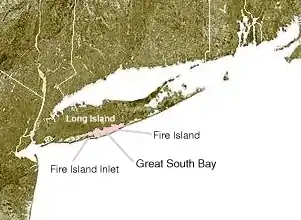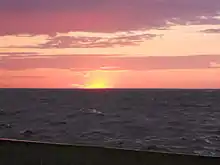Great South Bay
The Great South Bay is a lagoon[1] situated between Long Island and Fire Island, in the State of New York. It is about 45 miles (72 km) long and has an average depth of 4 feet 3 inches (1.3 m) and is 20 feet (6.1 m) at its deepest.[2] It is protected from the Atlantic Ocean by Fire Island, a barrier island, as well as the eastern end of Jones Beach Island and Captree Island.

Robert Moses Causeway adjoins the Great South Bay Bridge, which leads to Robert Moses State Park.

The bay is accessible from the ocean through Fire Island Inlet, which lies between the western tip of Fire Island and the eastern tip of Jones Beach Island. The bay adjoins South Oyster Bay on its western end, and Patchogue and Moriches bays at the east end.
History
In the early 17th century, European settlers first encountered the native Montaukett Indian Nation. Among the earliest British families were the Smith, Carman and Hewlett families.[3] Long Island's South Shore, adjacent to the bay, now includes the communities of Lindenhurst, Babylon, Islip, Oakdale, Sayville, Bayport, Blue Point, Patchogue, Bellport, Shirley, and Mastic Beach.
Environmental concerns

In the late nineteenth century Great South Bay provided many of the clams consumed throughout the region and even the country. The first oysters to be exported from the US to Europe came from Great South Bay. By the latter 20th century, a significant percentage of the habitat was lost.[4] Hurricane Sandy in 2012, the largest storm to affect the region since 1938, made landfall with devastating impact to Fire Island seashores, including multiple breaches, the largest of which formed just south of Bellport. This was formerly known as Old Inlet. Residents were concerned it would have effects on tidal increases and potential flooding, when in actuality it has allowed the bay to relieve some of its captive water, which has changed the salinity and nitrogen levels in the bay.[5] After roughly 75 years, the bay began flushing itself out which may improve the water condition within the bay.[6] Regulations set forth by the US Government National Wildlife Preserve, which has a seven-mile stretch of land (The Otis Pike Fire Island High Dune Wilderness) prohibit any unauthorized parties from performing any kind of man-made changes, thus the inlet has remained open. There have been a number of ongoing public meeting discussing the future of the Inlet.[7] All the other breaches were closed by the Army Corps of Engineers. In 2012, The Save the Great South Bay (STGSB) not-for-profit organization was formed in order to work towards better conservation of the water and its beachfronts.[8][9] Save The Great South Bay has raised awareness of boat sewage dumping in The Great South Bay as a serious ecological concern.[10]
See also
References
- Goodbred Jr., S.; Locicero, P.; Bonvento, V.; Kolbe, S.; Holsinger, S. "History of the Great South Bay estuary: Evidence for a catastrophic origin" (PDF). State University of New York (SUNY.com). Retrieved 2013-10-02.
- "Loving L9ng Island: The Great South Bay Long Island, New York". Retrieved 2020-08-02.
- "Carman Web Space 2001".
- Andrea Schwalm (January 18, 2013). "New Fire Island Breach Could Be Beneficial Unless Government Fills It In". Wired. Retrieved June 29, 2018.
- Marshall Brown (16 April 2013). "What Mother Nature and The New Inlet Can't Do — A Bay in Peril". Save The Great South Bay. Retrieved June 29, 2018.
- "Post-Hurricane Sandy: Old Inlet Breach on Fire Island - Fire Island National Seashore". Archived from the original on 2013-01-13.
- Lisa W. Foderaro (October 3, 2016). "On Fire Island, a Scar From Hurricane Sandy Is Seen as a Good Thing". The New York Times. Retrieved June 29, 2018.
- Will James (November 13, 2013). "On Long Island Coast, An Unexpected Gift From Hurricane Sandy". The Atlantic. Retrieved June 29, 2018.
- Jason Atkinson (September 20, 2013). "Conservation's Radical Middle". HuffPost. Retrieved June 29, 2018.
- Howard Ryan (June 19, 2018). "Pumpouts in The Great South Bay: Are Boaters Pumping or Dumping? STOP POO-LLUTION!". Save the Great South Bay. Retrieved June 19, 2018.
External links
- United By Water - It is no coincidence that The Great South Bay and the New York–New Jersey Harbor estuaries are home to one of the most vibrant and economically important metropolitan areas in the country and the world.
- Back To Baysics - Great South Bay environmental awareness campaign
- Great South Bay Project
- Peconic Baykeepers The Waterkeeper Alliance Member for the Great South Bay
- NOAA chart 12352